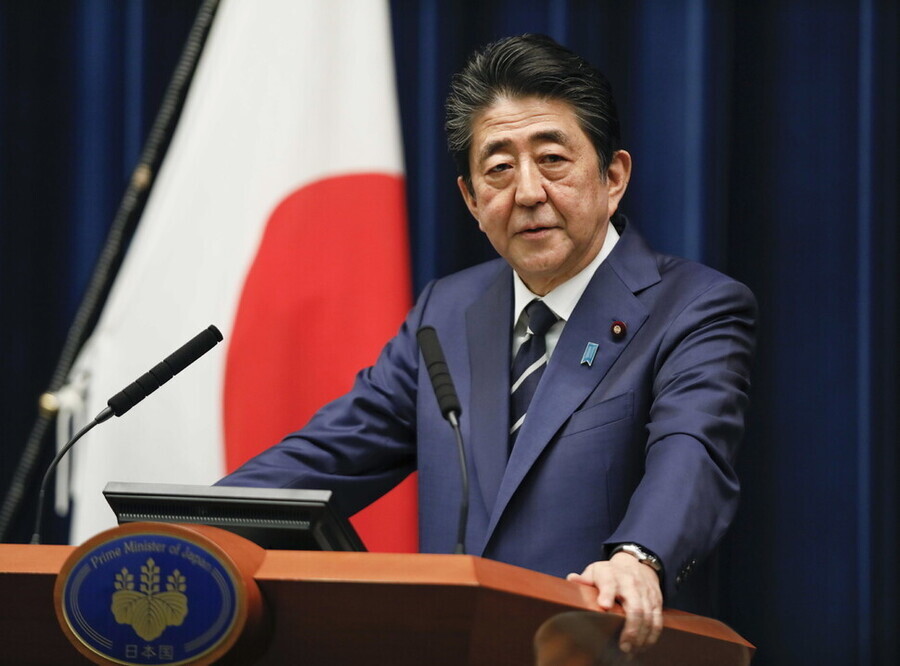hankyoreh
Links to other country sites 다른 나라 사이트 링크
Abe urges successor to reach conclusion on Japan developing military strike capabilities

As he prepares to step down, Japanese Prime Minister Shinzo Abe issued a statement urging his successor’s administration to reach a conclusion by the end of the year on acknowledging Japan’s possession of “enemy base attack capabilities.” The capabilities in question refer to Japan’s ability to launch direct strikes against missile bases in North Korea and elsewhere. The conclusion reached by the next administration stands to have considerable repercussions for South Korea’s security.
Following a National Security Council (NSC) meeting on Sept. 11, Abe issued a statement regarding a new policy on “missile blocking.” In it, he announced plans to “respond to the security guarantee environment surrounding Japan” by holding more discussions with the ruling Liberal Democratic Party (LDP) to state a policy approach by the end of 2020.
The expression “missile blocking” has been adopted by the LDP recently after a public outcry over “enemy base attack capabilities” being in violation of the principle that Japan should use military force only when under attack, and only within a minimal scope. In his statement, Abe raised the North Korea threat as a factor necessitating the new policy on missile blocking, explaining that the North “possesses hundreds of ballistic missiles within firing range of Japan.” In a gesture toward the public’s objections, he stressed that the examination of the new security guarantee measures was “taking place in compliance within the scope of the Constitution and in observance of international law,” adding that there had been “no change in my beliefs about exclusively defense-oriented policies.”
Abe is set to step down as prime minister on Sept. 16 after announcing his plans to resign late last month due to a recurrence of ulcerative colitis. He appears to have issued his latest statement to ensure that the new Cabinet produces a conclusion on the enemy base attack capability issue after he leaves office.
Discussions on acquiring enemy base attack capabilities have surfaced periodically in Japan since the 1950s, but only at the level of theoretical consideration to explore the potential for them to be in violation of the Constitution. Under the Abe administration, the calls for such capabilities have intensified as the North Korean missile threat has been underscored. They gained even further steam after the administration’s decision in June to abandon plans to introduce an Aegis Ashore land-based interception missile system for defense against North Korean missiles, citing technical issues.
On the morning of Aug. 4, the LDP suggested to the administration that Japan “needs new response measures to improve deterrence, including the ability to block ballistic missiles even within the other country’s territory.” At the time, Abe replied that he planned to “take up the suggestions, and present and swiftly implement a new direction.”
By Cho Ki-weon, staff reporter
Please direct comments or questions to [english@hani.co.kr]
Editorial・opinion
![[Column] Welcome to the president’s pity party [Column] Welcome to the president’s pity party](https://flexible.img.hani.co.kr/flexible/normal/500/300/imgdb/original/2024/0515/3917157400447943.jpg) [Column] Welcome to the president’s pity party
[Column] Welcome to the president’s pity party![[Editorial] Korea must respond firmly to Japan’s attempt to usurp Line [Editorial] Korea must respond firmly to Japan’s attempt to usurp Line](https://flexible.img.hani.co.kr/flexible/normal/500/300/imgdb/original/2024/0514/2317156736305813.jpg) [Editorial] Korea must respond firmly to Japan’s attempt to usurp Line
[Editorial] Korea must respond firmly to Japan’s attempt to usurp Line- [Editorial] Transfers of prosecutors investigating Korea’s first lady send chilling message
- [Column] Will Seoul’s ties with Moscow really recover on their own?
- [Column] Samsung’s ‘lost decade’ and Lee Jae-yong’s mismatched chopsticks
- [Correspondent’s column] The real reason the US is worried about Chinese ‘overcapacity’
- [Editorial] Yoon’s gesture at communication only highlights his reluctance to change
- [Editorial] Perilous stakes of Trump’s rhetoric around US troop pullout from Korea
- [Guest essay] Preventing Korean Peninsula from becoming front line of new cold war
- [Column] The state is back — but is it in business?
Most viewed articles
- 1[Editorial] Korea must respond firmly to Japan’s attempt to usurp Line
- 2[Editorial] Transfers of prosecutors investigating Korea’s first lady send chilling message
- 3[Column] Welcome to the president’s pity party
- 4Second suspect nabbed for gruesome murder of Korean in Thailand, 1 remains at large
- 5Could Korea’s Naver lose control of Line to Japan?
- 6Major personnel shuffle reassigns prosecutors leading investigations into Korea’s first lady
- 7Naver’s union calls for action from government over possible Japanese buyout of Line
- 8Unexpected rate of AI development requires timely discussion of side effects
- 9US has always pulled troops from Korea unilaterally — is Yoon prepared for it to happen again?
- 10China gains 2 new ambassadors to Korea in form of newborn panda cubs